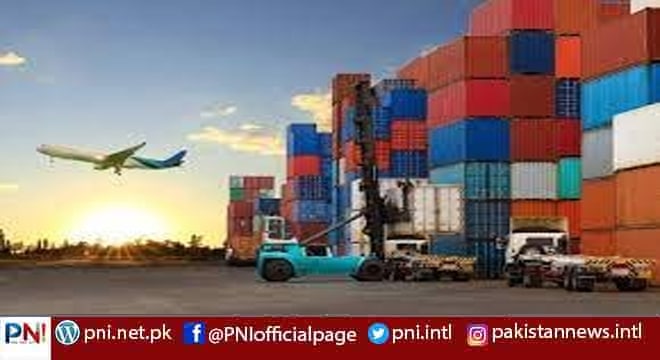ISLAMABAD, Jul 24 (APP): When the political bigwigs are busy in massive politicking, country’s economy is struggling against local and international challenges with the trade deficit and rupees value downing to every lowest.
Although the incumbent government is striving hard to level the country’s imports with exports and enhance remittance volume to control ever-increasing trade deficit, the challenge seems too gigantic to be beyond the grip of any single political force.
Therefore, the financial pundits urge the political leadership in the country again and again to join hands for evolving consensus strategy for economic revival and boosting exports since trade deficit had remained a challenging task for successive governments over the decades.
Inheriting it from the previous government, the present PML-N led coalition government is serious moving forward to take on the gigantic task of overcoming trade deficit for sustainable economic development.
Minister of Finance and Revenue, Miftah Ismail has also acknowledged that import substitution had not been in line with modern trade principles and highlighted the importance of enhancing export base for Pakistani products.
“We have to increase our exports in the global market by making our products competitive,” he remarked and mentioned to the government steps aimed at bridging the gap between imports and exports.
“The government is working on diversifying both the dimensions; producing cheaper and quality products and explore new markets for export of Pakistani goods,” the minister said as he referred to fresh initiatives taken by the government to strengthen exports in European and African markets.
He said, the EU delegation recently visited Pakistan and reiterated its commitment to promote trade and economic relations between Pakistan and the European Union. “Trade and GSP plus was particularly discussed during meetings with the delegation to enhance country’s exports.”
There is no denying the fact that successive governments throughout the past had taken several measures to deal with the issue, however no productive outcome could be witnessed.
The PML-N led coalition government soon after assuming power took fresh measures to control trade deficit that had widened to around US$48.259 billion during the fiscal year 2021-22, according to latest data of Pakistan Bureau of Statistics (PBS).
The government is adopting both traditional and non-traditional approaches under the Import Compression Strategy and had recently banned import of around 750 items, particularly luxury items for the first two months of the current fiscal year. Under the decision, imports of cars, mobile phones, cosmetics, cigarettes, food products, some garments and many other luxury items were banned.
Under this decision ban has been imposed on import of items like pet food, weapons and ammunition, shoes, chandeliers and lighting, headphones, decoration pieces, sauces and ketchup, home appliance, cosmetics, crockery, luxury leather apparel, musical instruments, saloon items and chocolates in retail packing, travelling bags and suitcase, sanitary ware, fish and frozen fish, bathroom ware, toiletries, heaters, blowers, sunglasses, kitchen ware, aerated water, frozen meat, juices, pasta, ice cream, cigarettes, shaving goods, preserved fruits, tissue papers, furniture, shampoos, cars, confectionary, luxury mattresses and sleeping bags, jams and jelly and cornflakes.
The strategy worked as the imports were constrained to almost US$2.609 billion during the first eighteen days of July 2022, indicating that there would not be more than $5.5 billion imports throughout the month. This is a positive development, showing decline of almost US$2 billion against the imports of $7.5 billion recorded in June 2022.
“European Union is a major trading partner of Pakistan and there are many opportunities for Pakistan to increase its trade volume with EU,” said Commerce Secretary Muhammad Sualeh Ahmad Faruqi and informed that exports to several EU countries including Italy, the Netherlands and Spain had already been on rise.
Successive governments also held several conferences and seminars in African countries under ‘Look Africa’ initiative over the years to promote trade. Currently, Pakistan’s annual trade volume with African countries is approximately US$4.20 billion, which is far below than its potential.
In addition, negotiations were currently underway with the United Kingdom (UK), the third largest global trading partner of Pakistan, to boost bilateral economic and trade relations and increase bilateral trade to £seven billion by 2025.
“United Kingdom (UK) and Pakistan have discussed to further strengthen economic ties between the two countries and double their trade to £seven billion by 2025,” Counselor and Group Head (Economic and Trade), British High Commission Mahesh Mishra told APP.
Since, the bilateral trade between Pakistan and United Kingdom was recorded at £3.5 billion during last fiscal year, Mahesh Mishra said, as United Kingdom is also the second largest investor in Pakistan in development sector, “We desire to explore more avenues for joint ventures and investment in the country.”
Meanwhile, President of Federation of Chambers of Commerce and Industry, Irfan Sheikh reiterated to contribute in the government efforts for bridging the trade deficit. “We need concrete measures to control deficit and promote and protect local industry for laying down sustainable base for country’s economy.”
He also highlighted the importance of trade diversification mentioning to the information technology as a lucrative sector to help boost country’s exports.
Since all segments of society are worried about present economic situation, it is high time for political forces and economic experts to join hands for evolving a long term and sustainable economic policy to steer country out of crisis and secure the future of coming generations.
Follow the PNI Facebook page for the latest news and updates.









